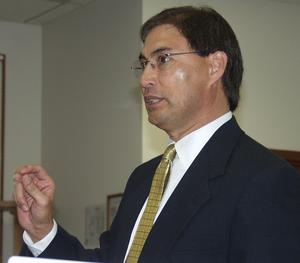Professor speaks about Supreme Court decisions

Chadron State College justice studies professor George Watson said Wednesday, Feb. 11, that he had no difficulty selecting the top three cases heard by the U.S. Supreme Court during its 2003 term. However, he said it appears that decisions the court will be making this year will be more monumental.
Topping Watson’s list for the past year was the affirmative action case at the University of Michigan in which the court ruled 5-4 that the law school could use race as a factor in admitting students so it would have a more diverse student body.
“The court’s decision reaffirmed that diversity in the student body justified race-conscious affirmative action,” said Watson, who practices law besides teaching at Chadron State.
Second on the list was a ruling that overturned a Texas statute making it a crime for two persons of the same sex to engage in certain intimate sexual acts. Third was a decision in which the court said the government can withhold federal assistance from libraries that do not install software on computers to block obscene or pornographic images without infringing on First Amendment rights.
Ranking fourth on Watson’s list was a decision that permits the government to administer drugs to render a mentally ill defendant competent to stand trial.
Another case on the “most significant” list for the past year involved the statute of limitations and whether a sex offender could be tried for crimes committed 35 years ago when the statute of limitations for prosecution was only three years. Watson said the court determined 5-4 that the California law that allowed prosecution could not be applied because it violated the ex post facto protection of the constitution.
In concluding his presentation, Watson said the 2004 term of the court may be one of the most intriguing in years. Cases that are due to be heard include whether reciting the Pledge of Allegiance with its reference to God violates the establishment clause, whether scholarships awarded by the state can be used to prepare for the ministry at private institutions and how the nation’s freedom of speech applies to the internet.
He added that cases involving terrorism and the so-called Patriot Act are also on the docket, although the Bush Administration would prefer they not be heard.
Watson said 2004 also could be significant if any of the justices, particularly Sandra Day O’Connor, retires. O’Connor’s husband recently suggested that she might step down. Watson said a recent poll found O’Connor to be the most well-known Supreme Court member, He also pointed out that she often casts the “swing” vote. Last year when the court had 13 five-to-four decisions, she was in the majority all 13 times.
Watson, who has been speaking on the Supreme Court at programs sponsored by Phi Alpha Theta History Fraternity at CSC nearly every year since 1977, said the current court has been intact for one of the longest periods of history. Stephen Beyer was the last appointee in 1994.
The court continues to exercise restraint in hearing cases, Watson noted. It heard just 73 cases last year, or about 100 fewer than it often heard some 25 years ago.
Watson quoted Chief Justice William Rehnquist, who may also be contemplating retirement, as saying the court has changed from “an error-correcting court of general appellate jurisdiction to a court whose special concerns are constitutional interpretation and significant questions of federal law.”
Watson added that today’s court seldom hears cases in which decisions involving state rights are questioned.
Category: Campus Announcements, Campus News, Justice Studies
